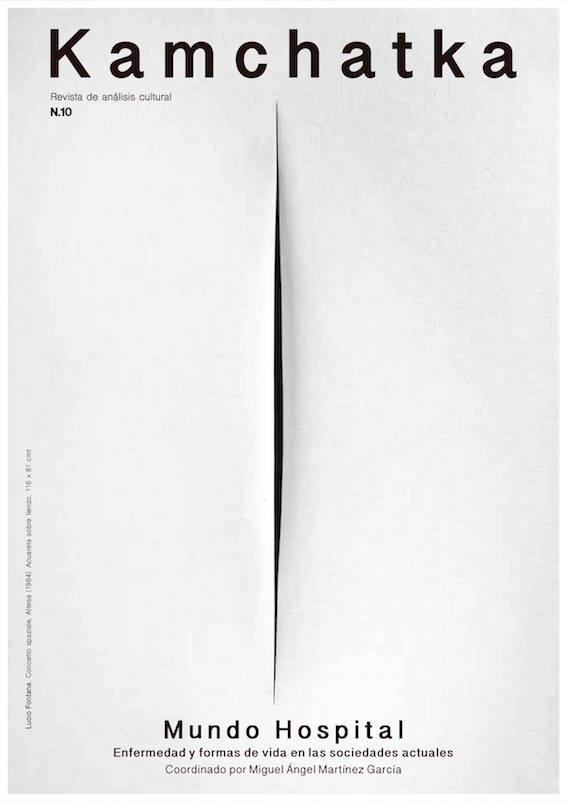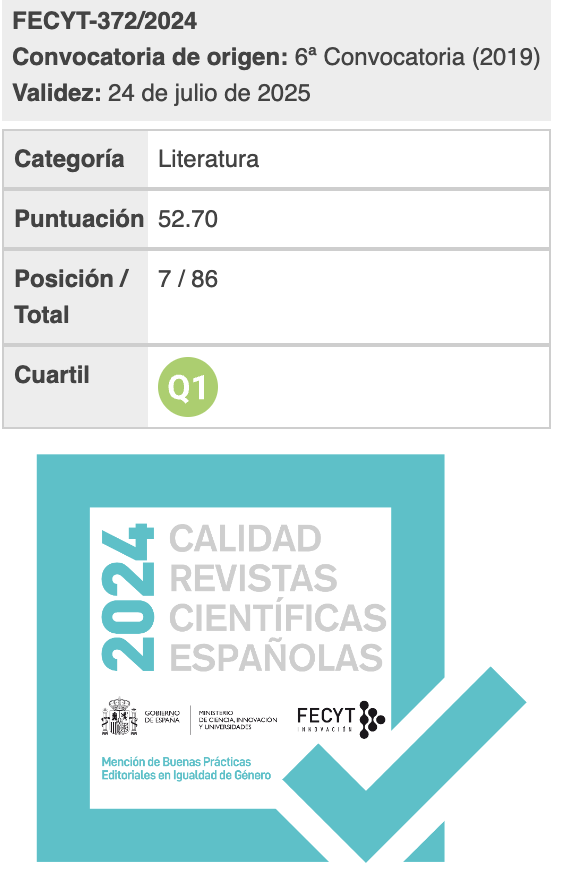Biopower, Body Commodification, and Defiance of Neoliberal Logic in Impuesto a la Carne by Diamela Eltit / Biopoder, mercantilización del cuerpo y desafío a la lógica neoliberal en Impuesto a la carne de Damiela Eltit
DOI:
https://doi.org/10.7203/KAM.10.10262Palabras clave:
Biopower – Body, Chile, Eltit, Neoliberalism, Resistance, Hospital Resumen
Resumen
This article analyses the novel Impuesto a la carne (2010) by Diamela Eltit and favors a reading that focuses on the past forty years of Chile’s history. Drawing on recent biopolitical concepts by Foucault and Agamben, this article demonstrates how the hospital setting in Eltit’s novel allows her to embody neoliberalism and account for the usually invisible bodily experiences of racialized and gendered patients/citizens, while simultaneously showing that the neoliberal model, in its quest for continuous expansion, is now colonizing the inner spaces of the corporeal body. This article also briefly shows that through her writing of the maternal body, Eltit highlights its potential for resistance and for meaningful connections to other human beings. Her novel thus calls for the emergence of a renewed type of activism that brings together marginalized communities to denounce the embodied nature of social injustice created and reinforced through neoliberalism and to potentially attain the social equality that democracy was supposed to deliver.
Este artículo propone un análisis de la novela Impuesto a la carne (2010) de Diamela Eltit. Basándose en parte en conceptos de biopoder propuestos por Foucault, se demuestra cómo el marco del hospital donde el sufrimiento extremo y el abuso prolongado infligido sobre los cuerpos posiblemente indígenas de la narradora y su madre, le permite a Eltit remitir a la versión silenciada de la historia de Chile y especialmente a su reciente pasado totalitario. Eltit expone cómo el modelo neoliberal vigente es dependiente de los cuerpos humanos para funcionar, y denuncia algunos de los procesos usados por el estado-mercado para excluir, explotar y beneficiarse de lo que considera cuerpos marginados. Este artículo revela también cómo, en su escritura, Eltit recalca el poder de resistencia del cuerpo materno y su potencial para crear conexiones significativas entre seres humanos. En este sentido, la novela anuncia la emergencia de un tipo renovado de activismo que une a las comunidades marginalizadas para denunciar la naturaleza corporalizada de las injusticias sociales creadas y reinforzadas por el sistema neoliberal.
 Descargas
Descargas
 Citas
Citas
Achtenberg, Ben. “Disciplining Physicians for Complicity in Torture: The Historical Record is not Encouraging”. Physicians and Torture (2011).
Agamben, Giorgio (2005). State of Exception. Kevin Attell (trad.). Chicago: U of Chicago P.
Avelar, Idelber (1999). The Untimely Present: Postdictatorial Latin American Fiction and the Task of Mourning. Durham: Duke UP.
Cárcamo-Huechante, Luis E (2007). Tramas del mercado: Imaginación económica, cultura pública y literatura en el Chile del fines de siglo veinte. Santiago: Editorial Cuarto Propio.
Crinson, Lain. “Sociological Conceptualization of Medical Knowledge and Power”. Health Knowledge (2007).
Eisenstein, Zillah (1996). “Writing Hatred on the Body”. Hatreds: Racialized and Sexualized Conflicts in the 21st Century. New York: Routledge.
Eltit, Diamela (2008). “Contante y sonante.” Sonia Montecino Aguirre (eda.) Mujeres chilenas: Fragmentos de una historia. Santiago: Editorial Catalonia: 389-393.
Eltit, Diamela (2010). Impuesto a la carne. Santiago: Editorial Planeta Chilena.
Foucault, Michel (1976). Histoire de la sexualité I: La volonté de savoir. Paris: Gallimard.
Foucault, Michel (2010). The Birth of Biopolitics: Lectures at the Collège de France. Burchell, Graham (trad.). François Ewald, Alessandro Fontana y Michel Senellart (eds). New York: Palgrave Macmillan.
Foucault, Michel (1994). The Birth of the Clinic: An Archeology of Medical Perception. A.M. Sheridan Smith (trad.) New York: Vintage Books.
Frazier, Lessie Jo (2003). “Medicalizing Human Rights and Domesticating Violence in Postdictatorship Market-States”. Arturo J. Almada (ed.) Violence and the Body: Race, Gender, and the State. Bloomington: Indiana UP: 388-403.
Gabbert, Lisa and Antonio Salud II (2009). “On Slanderous Words and Bodies out-of-Control: Hospital Humor and the Medical Carnivalesque”. Elizabeth Klaver (eda.) The Body in Medical Culture. New York: State U of New York P.
Giddens, Anthony (1990). The Consequences of Modernity. Stanford: Stanford UP.
Green, Mary. “Dialogue with Chilean Novelist Diamela Eltit”. Feminist Review (2005): 164-71.
Green, Mary (2007). Diamela Eltit: Reading the Mother. Rochester: Boydell & Brewer.
Holmer Nadesan, Mejia (2008). Governmentality, Biopower, and Everyday Life. Hoboken: Taylor & Francis.
Horton, Scott. “A Medical Murder in Pinochet’s Chile”. The Stream. Harper’s Magazine (2009).
Human Rights Documentation Center. “Pinochet’s Legacy Still Haunts Mapuche.” Human Rights Feature Quarterly (2002): n.pag.
Kristeva, Julia (1980). “Motherhood According to Giovanni Bellini.” Jardine, Alice y Gora, Thomas y Roudiez, Leon S. (trad.) Leon S Roudiez (ed.) Desire in Language. New York: Columbia UP: 237-70.
Lynd, Juliet. “Writing from the Margins of the Chilean Miracle: Diamela Eltit and the Aesthetics and Politics of the Transition.” Post-Authoritarian Cultures. Luis Martin-Estudillo and Roberto Ampuero (eds). Nashvhille: Vanderbilt UP, 2008. 12-33.
Mariqueo, Reynaldo. “The Mapuche Nation”. Mapuche International Link (2002).
Murray, Susan. “Childbirth in Santiago de Chile: Stratification, Intervention, and Child Centeredness”. Medical Anthropology Quarterly 26 (2012): 319–337.
Murray, Susan. “Relation Between Private Health Insurance and High Rates of Caesarean Sections in Chile: Qualitative and Quantitative Study”. BMJ [British Medical Journal] 321 (2000): 1501-505.
Niebylski, Dianna. “Blood Tax: Violence and the Vampirized Body in Impuesto a la carne”. Arizona Journal of Hispanic Cultural Studies 15 (2011): 107-21.
Palmer, Victoria. “[Un]feeling: Embodied Violence and Dismemberment in the Development of Ethical Relations”. Review Journal of Political Philosophy 6.2 (2008): 17-33.
Pino-Ojeda, Walescka (2011). Noche y niebla: Neoliberalismo, memoria y trauma en el Chile postautoritario. Santiago: Editorial Cuarto Propio.
Raulff, Ulrich. “An Interview with Giorgio Agamben – Life, A Work of Art without an Author: The State of Exception, The Administration of Disorder and Private Life”. German Law Journal 5.5 (2004): 609-14.
Richard, Nelly (2012). “Una alegoría anarcobarroca de Diamela Eltit”. Julio Ortega (ed.) Nuevos hispanismos: Para una crítica del lenguaje dominante. Madrid: Iberoamericana: 377-83.
Richard, Nelly (1998). Residuos y metáforas: Ensayos de crítica cultural sobre el Chile de la Transición. Santiago: Cuarto Propio.
Ruddick, Sara (1989). Maternal Thinking: Towards a Politics of Peace. Boston: Beacon P.
Scheper-Hughes, Nancy. “The Ends of the Body: Commodity Fetishism and the Global Traffic of Organs”. SAIS Review 22.1 (2002): 61-80.
Solimano, Andrés (2012). Chile and the Neoliberal Trap. New York: Cambridge UP.
Sutton, Barbara (2010). Bodies in Crisis: Culture, Violence, and Women’s Resistance in Neoliberal Argentina. New Brunswick: Rutgers UP.
Weiss-Fagen, Patricia (1992). “Repression and State Security”. Patricia Weiss Fagen, Juan E Corradi y Manuel Antonio Garretón (eds). Fear at the Edge: State Terror and Resistance in Latin America. Berkeley: U of California P.
Descargas
Publicado
Cómo citar
-
Resumen1430
-
Artículo667
Número
Sección
Licencia
Los textos publicados en esta revista están –si no se indica lo contrario– bajo una licencia Reconocimiento-NoComercial 4.0 de Creative Commons. Puede copiarlos, distribuirlos y comunicarlos públicamente siempre que cite su autor y el nombre de esta publicación, Kamchatka. Revista de análisis cultural y no los utilice para fines comerciales. La licencia completa se puede consultar en Creative Commons.
Aquellos autores/as que tengan publicaciones con esta revista, aceptan los términos siguientes:
- Los autores/as conservarán sus derechos de autor y garantizarán a la revista el derecho de primera publicación de su obra, el cuál estará simultáneamente sujeto a la Licencia de reconocimiento no comercial de Creative Commons que permite a terceros compartir la obra siempre que se indique su autor y su primera publicación esta revista.
- Los autores/as podrán adoptar otros acuerdos de licencia no exclusiva de distribución de la versión de la obra publicada (p. ej.: depositarla en un archivo telemático institucional o publicarla en un volumen monográfico) siempre que se indique la publicación inicial en esta revista.
- Se permite y recomienda a los autores/as difundir su obra a través de Internet (p. ej.: en archivos telemáticos institucionales o en su página web) antes y durante el proceso de envío, lo cual puede producir intercambios interesantes y aumentar las citas de la obra publicada.





